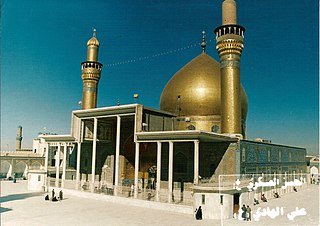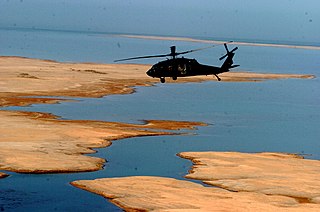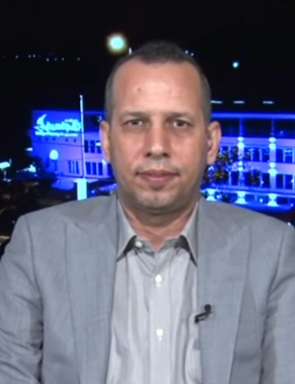Related Research Articles

This is a timeline of the events surrounding the United States-led invasion of Iraq in 2003.

The Battle of Baghdad, also known as the Fall of Baghdad, was a military engagement that took place in Baghdad in early April 2003, as part of the invasion of Iraq.

The 2003 invasion of Iraq involved unprecedented U.S. media coverage, especially cable news networks.
Anne Longworth Garrels was an American broadcast journalist who worked as a foreign correspondent for National Public Radio, as well as for ABC and NBC, and other media.

Control Room is a 2004 documentary film directed by Jehane Noujaim, about Al Jazeera and its relations with the US Central Command (CENTCOM), as well as the other news organizations that covered the 2003 invasion of Iraq.
Events in the year 2005 in Iraq.
Members of the Iraqi insurgency began taking foreign hostages in Iraq beginning in April 2004. Since then, in a dramatic instance of Islamist kidnapping they have taken captive more than 200 foreigners and thousands of Iraqis; among them, dozens of hostages were killed and others rescued or freed. In 2004, executions of captives were often filmed, and many were beheaded. However, the number of the recorded killings decreased significantly. Many hostages remain missing with no clue as to their whereabouts. The United States Department of State Hostage Working Group was organized by the U.S. Embassy, Baghdad, in the summer of 2004 to monitor foreign hostages in Iraq.

The 2006 al-Askari Shrine bombing occurred on 22 February 2006 at approximately 6:44 a.m. local Iraqi time, and targeted the al-Askari Shrine in the city of Samarra, Iraq. The attack on the mosque, one of the holiest sites in Shia Islam, has not been claimed by any group; the then President of the United States, George W. Bush, claimed that the bombing was an al-Qaeda plot. Although the mosque was severely damaged from the blast, there were no casualties.
The following lists events that happened during 2006 in Iraq.
Events in the year 2007 in Iraq.

Events in the year 2008 in Iraq.

The 2008 Iraq spring fighting was a series of clashes between the Mahdi Army and allies and the Iraqi Army supported by coalition forces, in southern Iraq and parts of Baghdad, that began with an Iraqi offensive in Basra.
The mass media in Iraq includes print, radio, television, and online services. Iraq became the first Arab country to broadcast from a TV station, in 1954. As of 2020, more than 100 radio stations and 150 television stations were broadcasting to Iraq in Arabic, English, Kurdish, Turkmen, and Neo-Aramaic.
Al-Baghdadia TV is an independent Iraqi-owned Arabic-language satellite channel based in Cairo, Egypt. It is considered a Nationalistic channel of funding directly and only from the CEO. During the Iraqi insurgency, several prominent journalists with the station were murdered. More recently, Global TV Stations depend on Al Baghdadia for news coming from Iraq. It has a live morning show called 'Al Baghdadia Wa El Nas' which is a free show that allows Iraqis to give their opinion and to send a message to the government, this supports Iraqi democracy. The CEO of Al Baghdadia believes that democracy should be created by true Iraqis, not by force. The TV station is dubbed the name 'Umm al-Fuqarā' . In 2012, Al-Baghdadia Media Group launches its second channel, B2, broadcasting mainly series, drama, movies and entertainment. since then Al Baghdadia 2 is first entertainment channel in Iraq, B2 freq on Nilesat.
Events in the year 2009 in Iraq.
Events in the year 2010 in Iraq.
Riad al-Saray was an Iraqi journalist, television presenter, lawyer and politician. He worked for the national TV channel Al Iraqiya from 2005 until his death. He was killed in a drive-by shooting carried out by a group of unknown gunmen. His murder was condemned by Reporters Without Borders and the British embassy in Baghdad, among others.
Hadi al-Mahdi was an Iraqi freelance journalist and radio talk show host of To Whoever Listens, which was broadcast by Radio Demozy out of Baghdad Iraq. He was assassinated in his home.
Najwa Kassem was a Lebanese journalist and television presenter (anchor) for Al Jadeed, Future TV and Al Arabiya.

Hisham al-Hashimi was an Iraqi historian and researcher in security and strategic affairs and extremist groups, and a specialist on the subject of the Islamic State and its supporters. He also was an advisor to the Iraqi government on counter-terrorism.
References
- 1 2 3 4 5 6 7 "Second Iraq TV presenter shot, Baghdad bombs kill four". BBC News . 2010-09-08. Retrieved 2010-10-01.
- ↑ "Iraq state TV anchor killed". AFP. 7 September 2010. Archived from the original on January 3, 2013. Retrieved 7 September 2010.